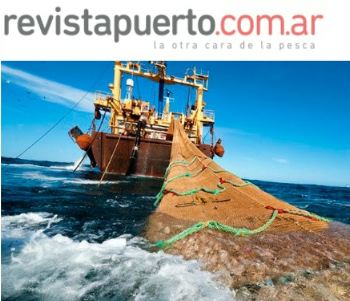|

Image: La Nación / FIS
Alert in the Argentine Sea: an impressive swarm of unregulated fishing boats threatens marine species
 ARGENTINA
ARGENTINA
Tuesday, March 21, 2023, 07:00 (GMT + 9)
The following is an excerpt from an article published by La Nación:
Jig vessels that catch squid operate in the areas adjacent to mile 200, outside the Argentine Exclusive Economic Zone (ZEEA); if they enter Argentine waters, the activity is considered illegal fishing.

Photo: La Nación
LA NACIÓN flew over mile 200, at the height of Comodoro Rivadavia; in its surroundings, foreign ships go after the coveted squid Illex argentinus; an activity that also threatens the national industry; NGOs ask to control the situation
Facing the Gulf of San Jorge, is the Blue Hole, a region of great biodiversity that is a source of food for various species that inhabit the Argentine Sea. There is the coveted Illex argentinus squid which, in addition to having commercial appeal throughout the world, is a migratory species and therefore is not always found within national waters.

Image: La Nación / Wiki / FIS
The cloudiness of the night turns the ships full of lamps into gigantic misty fireflies. The pilot circles, lowers several meters of flight height and breaks the clouds to be able to visualize the facts clearly. He wants there to be no doubt.
A voice is heard over the loudspeaker of the Boeing 787 of the NGO Solidaire:

"On the right you can see all the vessels in activity within 200 Argentine miles," says the pilot. The lights on the ships multiply as the plane moves forward and leaves behind cloud banks.
Although the exact count of ships within the ZEEA will be made once the plane has landed, Piñeyro specifies that during a similar flight carried out during April 2021, of the 500 vessels sighted, only 170 had the Automatic Identification System (AIS) turned on. ), which allows ships to communicate their position and make themselves visible. “It is the area with the highest AIS shutdown in the world”, repeats the captain.
“It is a problem for humanity,” Piñeyro emphasizes about predatory fishing, and specifies that the reason why he organizes, pays for and pilots these flights is so that the margin of uncertainty is zero. “These flights stop being a matter of opinion. It puts it in context and is a principle of solution. So far no one seems to take care of the problem. At least this is the kick to consider what we are missing and what we can do to solve it ”, he underlines.
Mariana Zuvic is National Deputy for the Autonomous City of Buenos Aires.
Is it illegal fishing?

In the absence of a regional organization for fisheries management in the maritime space bordering the ZEEA, the activities carried out by foreign vessels outside mile 200 do not comply with the aspects of the definition of illegal, unreported and unregulated fishing. (Indnr) established by the Food and Agriculture Organization of the United Nations (FAO)and, therefore, are not considered illegal. Illegal fishing, then, is determined when foreign fleet vessels enter our economic zone without authorization to capture species, and not just navigate.
Although the United Nations Convention on the Law of the Sea (UNCLOS) introduces provisions related to the conservation of living resources of the sea and delimits the jurisdiction of maritime spaces, the lack of regional regulation implies that there are no determinations on quotas of catches and fishing bans outside mile 200 and that poses a problem: the sustainability of marine species.
“Since these fishing activities are unregulated outside the ZEEA, they must be considered predatory. They produce ecosystem and environmental damage of unknown magnitude”, remarked Dr. Marcela Ivanovic, head of Cephalopod Fisheries; (continues...)
Author: Aníbal Greco | The Nation | Read the full article by clicking the link here (only available in Spanish)

Related News:


[email protected]
www.seafood.media
|



